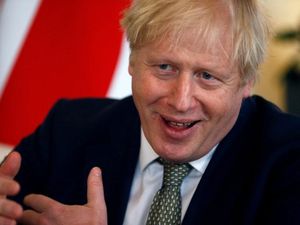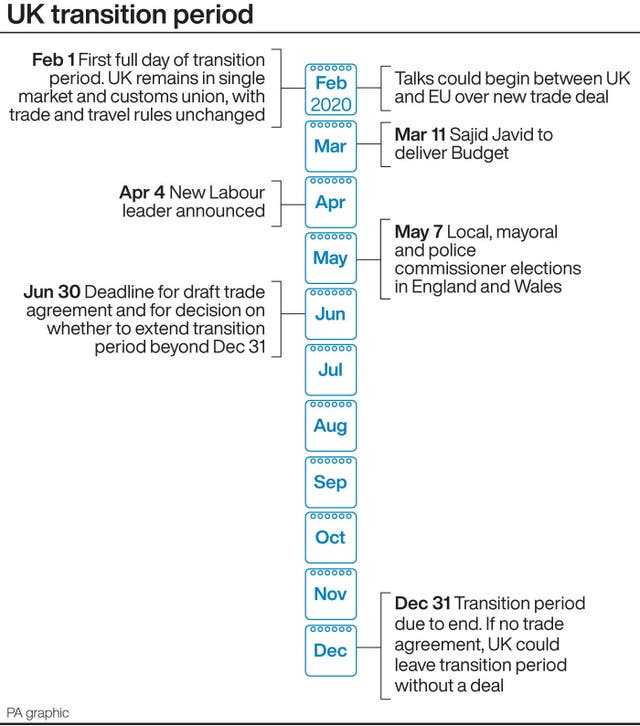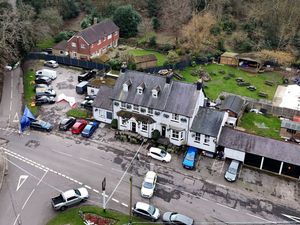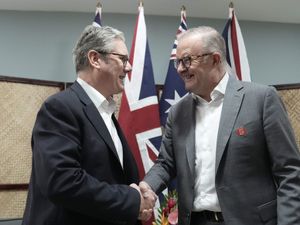Boris Johnson: No need for UK to follow Brussels rules in new trade deal
The Prime Minister will use his first speech since delivering Brexit to outline his vision for the UK’s future.

The Prime Minister will tell European leaders there is “no need” for the UK to agree to follow Brussels rules as part of a future trade deal.
Boris Johnson, in his speech on “unleashing Britain’s potential” on Monday, will also threaten to walk away and revert to World Trade Organisation (WTO) terms if European Union chiefs refuse to sign off on a Canada-style free trade agreement.
Setting out his post-Brexit vision following Friday’s departure from the EU, Mr Johnson will argue that the UK should not be required to continue to adhere to EU rules in any fresh trading pact.
“There is no need for a free trade agreement to involve accepting EU rules on competition policy, subsidies, social protection, the environment, or anything similar, any more than the EU should be obliged to accept UK rules,” he is expected to say.
“The UK will maintain the highest standards in these areas – better, in many respects, than those of the EU – without the compulsion of a treaty and it is vital to stress this now.”
The Conservative Party leader will reiterate his intention to negotiate a free trade agreement “similar to Canada’s” relationship with the EU.
And in a bid to rebrand a potential “no deal” trade deal outcome, Mr Johnson will tell his London audience the UK would “prosper” even on WTO terms, with additional mini-deals tacked on to ensure travel arrangements, such as international flights, can continue.
Mr Johnson will say he is prepared to end the transition period on December 31 with a deal akin to Australia’s – even though Australia does not have a deal with the EU.
Critics hit out at the Australia suggestion, with acting Liberal Democrat leader Sir Ed Davey calling it “no deal in all but name”.
Sir Ed said: “The looser the trading relationship with the EU, the less trade.
“Deliberately hollowing out our trade is nothing short of a scorched earth policy for our economy.”
The PM is planning to say: “We have often been told that we must choose between full access to the EU market, along with accepting its rules and courts on the Norway model, or an ambitious free trade agreement, which opens up markets and avoids the full panoply of EU regulation, on the example of Canada.
“We have made our choice – we want a free trade agreement, similar to Canada’s but in the very unlikely event that we do not succeed, then our trade will have to be based on our existing Withdrawal Agreement with the EU.
“The choice is emphatically not ‘deal or no deal’. The question is whether we agree a trading relationship with the EU comparable to Canada’s – or more like Australia’s.
“In either case, I have no doubt that Britain will prosper.”
The preferred Canada model – previously offered to the UK by EU chief negotiator Michel Barnier as an off-the-shelf solution for a trade deal – allows for almost complete tariff-free trade in goods, but entails some border checks and does not include the UK’s dominant services sector.

Analysis undertaken by the Treasury in 2018 predicted that Britain’s economy would be 4.9% worse off under such a deal within 15 years, when compared with expected growth if it had remained in the EU.
Mr Johnson – due to speak at a venue in the capital with historic trade ties, according to Downing Street – will also explore future security arrangements now Britain is no longer an EU member.
“We will seek a pragmatic agreement on security, protecting our citizens without trespassing on the autonomy of our respective legal systems,” he is due to say.
Trade talks between the two sides will commence in March, with the EU planning to publish its own mandate for the negotiations on Monday.
The UK, since its departure from the bloc last week, is now in an 11-month transition period in which it has no representation in Brussels but continues to follow EU rules while it works to agree a new relationship with the remaining 27 member states.





